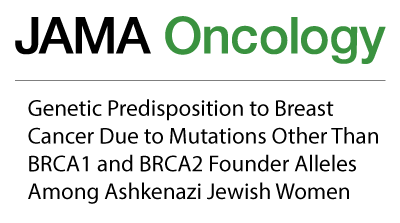Ever since actress Angelina Jolie’s highly publicized preventive mastectomy ignited discussion about BRCA 1 and BRCA2, almost everyone has heard about these genes and how they can increase risk of breast cancer. Some people even refer to them as “the breast cancer genes.” But how genes cause this disease is much more complicated than just through the most well known BRCA mutations, as a recent study in JAMA of Ashkenazi Jewish women has demonstrated. http://jamanetwork.com/journals/jamaoncology/fullarticle/2644652
This intriguing study raises a crucial question: How much sequencing is enough when diagnosing breast cancer in the age of targeted therapies? The number of these therapies keeps growing, as does our knowledge of the links between what drugs work for women with particular mutations. But at what point should we say we have uncovered enough mutations to make a proper diagnosis? And in a field in which we know there’s a lot we don’t know, is there such a thing as enough?
The good thing is that sequencing costs are going down. “It used to be that just testing for a single gene cost several thousand dollars,” says Jim Lund, Director of Tumor Product Development at WuXi NextCODE. “Now a panel of genes costs that and whole exome sequencing is slightly more.” At the same time, the number of mutations that are discovered and studied is increasing – in the genomes of patients and the genomes of their tumors.
The data here has a message about data itself: in principle, we should be generating as much sequencing data as possible. By generating it, storing it for vast numbers of patients and their healthy relatives, creating more comprehensive databases of all disease-linked variants, and then reanalyzing patient and tumor samples as more is learned, we can improve the risk assessment and the speed and accuracy of diagnosis for patients everywhere. Since we can do this, the question isn’t whether we can afford to do more sequencing, but why anyone would argue that we can afford not to.
The researchers who led the recent JAMA study used multiplex genomic sequencing on breast tumor samples from 1007 patients. They tested for a total of 23 known and candidate genes. It has been well documented that women of Ashkenazi descent have a higher risk of breast and ovarian cancer, and that is at least in part because of three particular BRCA1 and BRCA2 mutations. These are called founder mutations, because they probably originated among some of the earliest members of this ethnic group, and have been propagated because of a strong history of marriage within the same community.
But the researchers working on this study wanted to know if there were mutations in other genes besides BRCA that made it more likely these particular women would develop breast cancer. The patients were from 12 major cancer centers; had a first diagnosis of invasive breast cancer; self-identified as having Ashkenazi Jewish ancestry; and had all participated in the New York Breast Cancer Study (NYBCS).
Surprisingly, only 104 of the patients were carrying one of the infamous founder alleles. Seven patients had non-founder mutations in BRCA1 or BRCA2, and 31 had mutations in other genes linked to increased risk of breast cancer, including CHEK2. The vast majority of these women carried none of the mutations that are “obvious suspects” for breast cancer. “We do not know why those women got breast cancer,” says Shannon T. Bailey, Associate Director of Cancer Genetics at WuXi NextCODE.
It’s important to note that thousands of different cancer-predisposing mutations have been found in BRCA1 and BRCA2 alone. Every population studied to date includes people with such mutations. The three founder mutations that have been established as being common among Ashkenazis are estimated to account for about 10% of breast cancers in this group. The rest of BRCA1 and BRCA2 mutations are considered extremely rare under any circumstances.
“If you look at the genes on the panel used in this study, it looks as if they are mostly associated with DNA damage and there are no cell cycle regulating genes included,” says Bailey. “But there are all kinds of mutations that cause breast cancer, even in noncoding regulatory zones.” As a result, even the best designed panel may fall short.
That’s why this study is so important. It tells us that even with founder mutations, family history matters but it doesn’t yet always tell you everything you’d like to know. Of the women with the founder BRCA mutations, only about half had a mother or sister with breast or ovarian cancer. It’s also already well known that just carrying a BRCA1 or BRCA2 mutation is no guarantee the patient will get cancer. For reasons we don’t yet understand, these mutations raise overall risk, but not everyone who carries one will develop the disease. So while BRCA mutations are important, we need lots more information about other genes too.
The authors of this JAMA report suggest that Ashkenazi patients with breast cancers should have “comprehensive sequencing,” including, perhaps, complete sequencing of BRCA1 and BRCA2 and possibly testing for other breast cancer genes as well.
And what about other patients? WuXi NextCODE’s Lund points out that even the most highly regarded recommendations for breast cancer testing do not cite specific panels. Those recommendations come from the U.S. Government Task Force [https://www.uspreventiveservicestaskforce.org/Page/Document/RecommendationStatementFinal/brca-related-cancer-risk-assessment-genetic-counseling-and-genetic-testing] and the NCCN Clinical Practice Guidelines. Women with a family history will likely get more comprehensive testing, but beyond that it is not clear exactly how to proceed in every case.
At WuXi NextCODE we believe that this is clear evidence pointing to the value of doing more sequencing across all ethnic groups – for healthy individuals, patients, and their tumors, and pushing towards sequencing as standard of care. This would expand our knowledge of the genetic risk factors for breast and other cancers; provide vast new cohorts for research; and deliver the most actionable insights to patients, from risk assessment through diagnosis and then ongoing as new discoveries are made.
All of the participants in this JAMA study consented to have their sequence data used to advance research. They are already helping to do that, and this is just one study of thousands that are now underway and that are helping us to expand our data- and knowledgebases with the ultimate aim of delivering even better outcomes for all people and patients everywhere.


